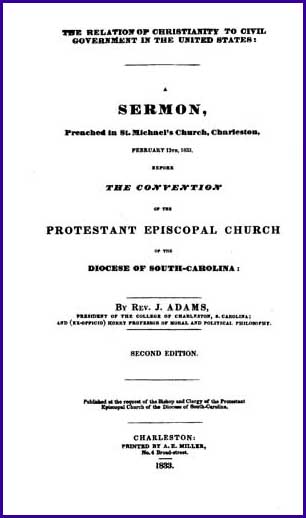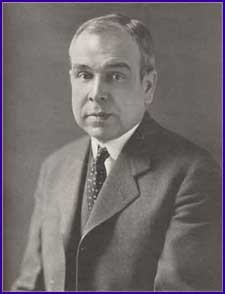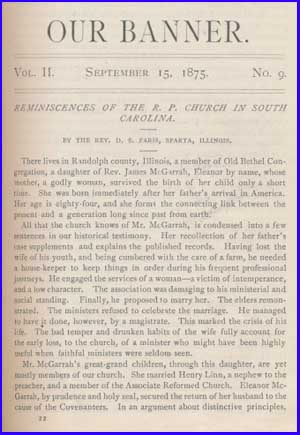Our series on the Westminster Shorter Catechism by Rev. Leonard T. Van Horn will resume next week. We are missing from our collection his material on Question no . 65, and that material is being supplied to us very soon by a dear friend of this ministry. So in the meantime, we present today a sermon by Rev. Van Horn, a message which seems only all the more relevant today.
“THE LORD REIGNETH!”
A Sermon preached at The First Presbyterian Church, Port Gibson, Mississippi, October 8, 1961,
by the minister, The Rev. Leonard T. Van Horn.
Scripture — I Chronicles 16:7-36.
One night last week I was in the midst of that malady known as “insomnia.” It was in the early hours of the morning, everything was very quiet. My thoughts turned to the conditions of the world in which we live. As I thought of the danger spots of the world — the places where war is going on, the places that could erupt into war at any moment, the fact that at any moment an all-out war could start — as I thought of these things my heart was heavy within me. Suddenly the quietness was broken by a roaring sound, the sound of planes up in the sky. There must have been many of them for the roar was loud and the roar lasted a long time.
I thought: Up above in the sky, in those planes, are men who are guarding those of us below. They are spending their night “out” and are forced to do so by the world in which we live.
Some moments passed. Suddenly a new sound filled the air. A sound of a train. It was not the regularly scheduled train that comes through each night. This was at a different time and was much longer. A man told me the next day that many of the cars had military supplies on them. (I did not ask him what he was doing up at that hour!)
I thought: That is probably a train of military supplies, maybe even troops. I remembered the day when I would look out the window of a train filled with soldiers, see a small town in the early hours of the morning, and wish I was back home. Men carrying military supplies, spending their night “out” and forced to do so by the world in which we live.
As I thought about the world in which we live, I thought about the statement I read one time by Lenin, the Russian communist, who said, “First we will take Eastern Europe, then the masses of Asia, then we will encircle the United States, which will be the last stronghold of capitalism. We will not have to attack. It will fall like an overripe fruit into our hands.” He made this statement in 1924.
In 1955, Khrushchev had this to say, “If anyone thinks that our smiles mean the abandonment of the teachings of Marx, Engles, and Lenin, he is deceiving himself cruelly. Those who expect this to happen might just as well wait for a shrimp to learn to whistle.”
I thought: This is our world. A world in which Communism is making rapid strides. A world that could well have before it a “Doomsday” — a day in the near future when men would destroy each other. A day when there would be no place safe, no place to which we might flee from killing rays of an atomic attack.
To make it even worse, I thought of the men in our country who are advocating the policy of “peaceful coexistence”, the men who are playing right into the hands of the enemy. Men who do not seem to realize that the tyranny of Communism is easily extended where there are those who are always trying to find something good about it. Men who do not seem to realize that the forces of evil have always made their gains in the following way: 1. They ask for tolerance — and there are men in this country today who are absolutely advocating a doctrine of tolerance for Communist nations. 2. They request equality — and there are men in this country today who are absolutely advocating a doctrine of equality for Communist nations. 3. They demand supremacy — and who knows when this will come? These are the men who want us to get along with everyone and are men who do not really stand for anything and so they fall for everything.
These are the men who put pressure on to admit Red China into membership in the United Nations. After all so goes their argument, Red China is there, and we had better be realistic about it. Congressman Walter Judd has a good answer for them: There are gangsters in Chicago and we had better be realistic about that too, but does it mean we should now add them to the police force?
Even in the church this philosophy is running rampant. Men who are professing Christians, ministers, who look with displeasure upon those who will stand firm for the faith, upon those who will insist upon allegiance to The Word of God rather than to the dictates of the organized church. The time has already come in many of our denominations, including our own, when anyone who has the courage to stand for his convictions, who contends earnestly for the faith, this person runs the risk of being branded as “uncooperative” or as a “fanatic.”
What we need today are more men like Lord Lawrence. In Westminster Abbey I saw a monument to him. Inscribed on it are his name, the date of his death, and these simple but significant words, “He feared man so little, because he feared God so much.”
At this point in my thinking, in the midst of my insomnia, things indeed looked black. It would be enough for a man to call his druggist in the middle of the night and ask for three different kinds of tranquilizer. What a world! What a trend is taking place! It is enough to make us call back to the generation before and ask, “What kind of a world did you give us?” It is enough to make a man a pessimist.
But then some words of Scripture came to me: “Let the heavens be glad, and let the earth rejoice; and let men say among the nations, The Lord reigneth.” (I Chron. 16:31). Without such words sleep would have been impossible, without such words a man could worry himself to death.
The next day when I arrived at my Study and was preparing this message, another verse came to my attention: “The name of the Lord is a strong tower: the righteous runneth into it, and is safe.” (Prov. 18:10). In the midst of this world in which we live, in the midst of the fact that men have decided on “peaceful coexistence” as the means to their end, I should like to present to you a few thoughts.
First, The Character of God Furnishes the Righteous Man With an Abundant Security. The character of God, the Almighty, Sovereign God Himself, is the refuge of the Christian in opposition to other refuges which godless men have chosen. I would like to remind you of the seven pillars of the house of sure salvation. Seven pillars given to us by the Sovereign God. Seven pillars found in the Word of God that should enable any child of God to take heart, even in the midst of this difficult and trying world. Listen to them, take them into your hearts and be thankful: HIs wisdom, His truth, His mercy, His justice, His power, His eternity, and last but not least, His immutability. The world may change. The world may involve itself in war after war. Men may be wiped off the face of the earth. But He is not capable of change! This is indeed a strong tower. With pillars uch as these we can be sure that The Lord Reigneth!
Second, He Has Proven His Security Time and Time Again to His People. I know that this is a matter of experience — and some will say we can’t use “subjective experience” for a proof — but no matter what name you give it, it is true. The poet put it this way and how wonderful a thought it is:
“There is a safe and secret place
Beneath the wings divine,
Reserved for all the heirs of grace;
That refuge now is mine.
The least and feeblest here may hide
Uninjured and unawed;
While thousands fall on every side,
I rest secure in God.”
You see, Brethren, no matter what your tribulation might be; no matter what your trouble might be; no matter how difficult things might be; He is there. If your trial in life is want, the Lord indeed will provide. His Word is filled with promises. Listen to one: “My God shall supply all your need according to His riches in glory by Christ Jesus.” (Philippians 4:19). If your trial is loneliness, the Lord is there with you. His Word is filled with promises to be with you. Listen to one: “Let your conversation be without covetousness; and be content with such things as ye have; for he hath said, I will never leave thee, nor forsake thee.” (Heb. 13:5). If your trial in life is war and the rumors of wars, The Lord will give you His peace. Listen again to The Word: “Peace I leave with you, my peace I give unto you; not as the world giveth, give I unto you. Let not your heart be troubled, neither let it be afraid.” (Jn. 14:27). If your trial in life is sin, remember that the Lord is your righteousness. God’s Word says, “If we confess our sins, He is faithful and just to forgive us our sins, and to cleanse us from all unrighteousness.” (1 John 1;9). Brethren, we can defy, in God’s strength, tribulations of every sort and size!
Third, The Righteous Avail Themselves of the Strong Tower by Running to It. Such is the teaching of Proverbs 18:10. I think this is very important for us in this day and age. It is an old saying and very true, “You do not parley with evil.” You do not try to find how you can get along with it, you run from it. Your attitude toward evil should be the same as the attitude of Norm Van Brocklin, the former All-Pro Quarterback. When asked why he ran with the ball in a game he stated, “I only run out of sheer terror!” And so should the Christian’s attitude toward evil be one of not wanting anything to do with it. We should not want anymore to do with evil than Norm Van Brocklin wanted to do with running the ball.
Somehow or other there is a new teaching making itself felt today. This new teaching, when coming face to face with evil, (and Brethren, evil is anything contrary to the standard of the Word of God whether it is in politics or in the work of the church), teaches us to see how we can get along with it. This teaching motivates us to have peaceful coexistence with evil. Brethren, if a thing is wrong, it is wrong and we have no right to tolerate it, to give it equality, for then someday we shall live under it. The teaching of the Word of God is that the Christian flees to his God. The teaching is “Flee!” Let someone call you a coward! Let someone tell you that you are not having the right attitude of love toward a thing, or a person, by not having the right attitude of love toward a thing, or a person, by not having anything to do with it. Let them persecute you for having nothing to do with those who would usurp The Word. Such is evil and we are to flee from it, and to the refuge of the Almighty, Sovereign God, and He will be our strong tower!
Yes, Brethren, it is true that we live in a dangerous, terrible world. It is true that there are things making their way to and fro in the world of today that seek to destroy us. It is true that “Doomsday” could be just ahead. It is true that many sitting here this morning may well be fighting on the fields of battle a year from now. It is true that sickness and pain and misery are all here with us. But take heart! The Lord reigneth! The Bible says, “Our life is hid with Christ in God.” We are in the hands of Christ. We are under the wings of the Deity. Our names are written in the Lamb’s Book of Life — if we have asked Jesus Christ to come into our hearts and save us from our sins. No one can erase them. We have a strong tower and we are safe, by His grace.
Spurgeon once told his people — and he can say it far better than I am able to say it — “I see no reason for us to stay down in the dungeons; let us go up to the very top of the ramparts, where the banner waves in the fresh air, and let us sound the clarion of defiance to our foes again, and let it ring across the plain, where yonder pale white-horsed rider comes, bearing the lance of death; let us defy even him. Ring out the note again; salute the evening, and make the outgoings of the morning to rejoice.”
“Munitions of stupendous rock,
Thy dwelling-place shall be;
There shall thy soul without a shock
The wreck of nature see.”
Brethren, may I remind you once again? May I announce it to you in a way that you will never forget it? May I sound forth the answer to anything the world might have to offer with its wars, tribulations, bombs, evil? The Lord Reigneth!

 The Rev. Jasper Adams was an Episcopal Minister and President of the College of Charleston when he preached this 1833 message to the Diocese of South Carolina at St. Michael’s church in Charleston, South Carolina. This sermon occurred a little over a half century after the American Revolution. In it, Adams argued at length that Christianity (Protestantism in the main) rested at the foundation of American political order. This sermon may be found on pp. 39-50 of Religion and Politics in the Early Republic, Daniel L. Dreisbach, ed. (Lexington, KY: The University Press of Kentucky, 1996).
The Rev. Jasper Adams was an Episcopal Minister and President of the College of Charleston when he preached this 1833 message to the Diocese of South Carolina at St. Michael’s church in Charleston, South Carolina. This sermon occurred a little over a half century after the American Revolution. In it, Adams argued at length that Christianity (Protestantism in the main) rested at the foundation of American political order. This sermon may be found on pp. 39-50 of Religion and Politics in the Early Republic, Daniel L. Dreisbach, ed. (Lexington, KY: The University Press of Kentucky, 1996).
